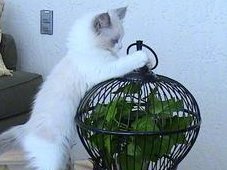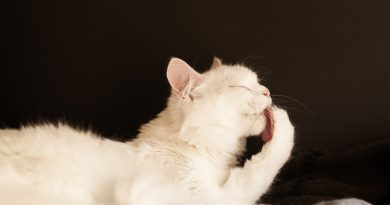Cats That Copy and Impersonate Other Animals

The episode wound up being the first recorded instance of a wildcat in the Americas mimicking the calls of its prey. But what could this mean in terms of your less wild house kitty? Can your domesticated cat copy other animals too?
Cats Mimic Prey
Wildlife Conservation Society researcher Fabio Rohe, who worked on the margay project, suspects all felines could have the copycat ability. "Cats are known for their physical agility, but this vocal manipulation of prey species indicates a physical cunning which merits further study," he says.
Although your cat may do nothing more than saunter from its bed to enjoy quality prepared food that you dish out, it still possesses hunting instincts with related talents that surface every now and then, if the opportunity arises. Opportunity in this case could refer to a bird squawking in front of one of your windows, or a mouse scurrying by.
Cat Chatter
"Cat chatter" usually begins with a bird loudly vocalizing near a cat. The cat becomes riveted to the bird. After just a minute, the cat will then start to "tweet" and chatter, its mouth moving in sync with the bird’s beak.
Studies, such as a California State Science Fair project conducted by Kelly McGinnis, suggest that cats communicate better with local birds than with birds they’re not as familiar with. "To recognize them as potential prey, cats have to come into contact with the bird," says McGinnis, who believes that’s the reason cats respond to local bird sounds. Contact in our scenario, however, could just mean seeing and hearing the birds through a coveted bird-watching window inside your home.
Why Housecats Chatter
"There are a few theories about why domestic cats chatter when hunting," says certified cat behavior consultant Marilyn Krieger, aka The Cat Coach. "The reasons that make sense to me are that they chatter in anticipation or they chatter when frustrated. Another probable reason for this is that they are chattering in response to the surge of adrenalin."
The word "chatter," however, implies meaningless sounds. Rohe’s work in the Amazon indicates that the sounds could be more meaningful to the intended prey than previously thought. For example, the monkeys in his study were nearly fooled, and many feral cats succeed in catching birds with their so-called "chatter" technique.
Feline Deception
Krieger thinks birdlike meowing is only one skill in a cat’s impressive hunting tool kit. Cat have also "perfected the art of stalking and waiting," she points out. "I suppose one could say that by not moving and visually blending in with the environment, they are deceiving their prey into believing that there are no immediate threats within striking distance."
Mice and other potential cat prey are often no match for your cat’s sensitive whiskers, padded paws to mask movements, keen ears and overall sleek ways. That’s one reason cats often startle their owners when they jump up on them: You may not even hear your pet’s approach.
Can Your Cat Mimic You?
YouTube is full of videos that claim to feature "talking cats," most of which simply show cats making unusual, human-like sounds when they are annoyed by something or they are about to expel a hairball.













